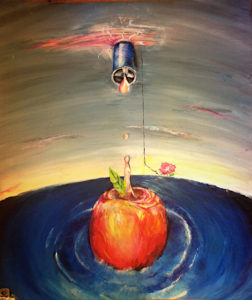Introduction
In recent times receiving a diagnosis of depression has become almost commonplace. There are television, magazine and billboard advertisements encouraging us not to be embarrassed by feeling depressed, not coping, and being disabled by the blues. We are encouraged us to talk about our difficulties, to reach out amd seek professional help.
In the first place, many people find themselves receiving a diagnosis of depression from their GP in the course of a fifteen minute consultation. Your doctor might recommend you try a course of anti-depressants, generally an SSRI (Selective Serotonin Reuptake Inhibitor), and perhaps suggest some counselling, CBT (Cognitive Behavioural Therapy), or psychotherapy. Sometimes you get relief from these medications and bear the side-effects, but other times you may find them useless, or not worth the side effects, and stop taking them. Sometimes counselling or CBT helps, at least in the short term.
What Is Depression?
Views seem to be divided on whether depression is the result of faulty brain chemistry, faulty thinking, or some combination of the two. Sometimes it seems hard to differentiate between ordinary feelings of sadness, loneliness or unhappiness, and feeling depressed. It is often associated with other difficulties such as a relationship breakdown, unemployment, or physical disability.
Sometimes depression can be life-threatening, a “black dog” that disables your every attempt at living your life. It may become a “vicious circle”, a self-fulfilling spiral that results in you losing your livelihood, your family, home and friends. Sometimes it is associated with addiction, alcoholism and suicide. It has been called a “dark night of the soul”.
On the other hand, it is sometimes forgotten that depression is a vital part of a normal life. If someone reports never experiencing depression, this may be an indicator of serious underlying psychological difficulties. Temporarily feeling depressed is a normal part of grieving life’s many losses and without it we can never really develop a secure sense of ourselves as having a place in the world.
Diagnosis Of Depression
Unfortunately the diagnosis of psychological illness has always been problematic since, unlike a physical illness, there is no way to concretely verify an interpretation of symptoms. There is no blood test, x-ray or cat-scan for depression, and neither neuroscience nor genetics has yet produced convincing evidence of its basis as physical ailment! In fact a diagnosis of depression is generally based solely on your subjective report of your experience of life, taken as a symptom.
Depression as a clinical condition is a fairly recent phenomena. It was largely created by the pharmaceutical industry to match the effects of psychoactive drugs they had discovered and euphemistically called “medications”. The closest equivalent prior to this was something known as “melancholia”.
Depression, Melancholia and Auto-Immune Disease
Freud discussed melancholia at length and understood depression or melancholia as the result of normal aggression and hatred turned against the self. The original object of the aggression or hatred has been forgotten or repressed because there was something unbearable or not permissible about being angry or hating this person or experience. The self now becomes the hated thing.
Seen in this way depression may be understood as a kind of ‘auto-immune disease’. Aggression, anger and hatred may all be useful responses to a world that is experienced as hostile, frustrating or malevolent: They give us information, energy and the means to ward off danger. This is a somato-emotional immune response which has evolved to increase our chances of survival. However, sometimes over the course of our development these immune responses become distorted or forbidden, and then they can turn against us. Their purpose remains our protection, but now we are understood as the problem rather than our environment.
In this way, suicide may be understood as a last ditch attempt by someone to protect an essential sense of themselves: Unfortunately it appears the idea of death has no place in our unconscious, so destroying the thing that seems to be the problem makes perfect sense. Suicide is almost always a case of mistaken identity.
… Sorry I am busy with patients, but I will be back to finish writing this soon!
